August brings an almost overwhelming bounty of great crime novels, both from promising newcomers and established voices alike. The variety of subject matter is almost as astonishing as the vast number of releases, and below, you’ll find such disparate settings as a ballet school, an apartment in lockdown, 1970s Mexico, and 1940s Chicago and Paris, just to mention some. Whether your tastes are traditional or twisted, you’ll be sure to be pleased with August’s selections. Stay tuned for more recommendations.
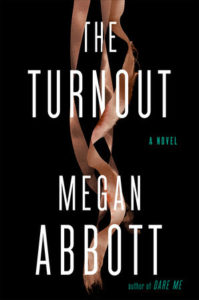
Megan Abbott, The Turnout
(Putnam)
Megan Abbott has already written about the high-stakes (and highly dangerous) sports of cheerleading and gymnastics, and now she turns her attention to the world of ballet. Abbott is not only a suspense author at the top of her game, she’s also a scholar, and The Turnout promises to be both homage to classic tropes and visionary model for their evolution. In this semi-gothic tale of a family-run ballet studio, two sisters teach the classes while their injured brother runs the office. Their parents died in a suspicious accident over a decade earlier, but suspicions and resentments need the arrival of an interloper, as well as a ballet season beset by disaster, in order to be let loose in their fully monstrous forms. –MO
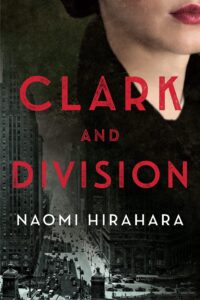
Naomi Hirahara, Clark and Division
(Soho)
Clark and Division is one of the year’s most powerful historical mysteries, centered on the turbulent life of a Japanese-American family interned in California during WWII and later resettled in Chicago. The family arrives in their new home only to be told that one of their daughters, who was sent months before, has supposedly committed suicide. Her sister is driven to investigate herself, and the story transforms into a larger chronicle of a hidden chapter of modern American history and an absolutely compulsive mystery. –Dwyer Murphy, CrimeReads Editor-in-Chief
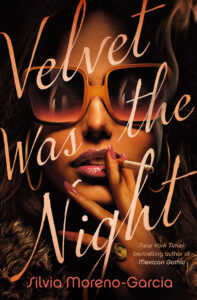
Sylvia Moreno-Garcia, Velvet Was The Night
(Del Rey)
Sylvia Moreno-Garcia dazzled me with her fungal-punk horror novel Mexican Gothic, and I couldn’t wait to dive into her 1970s-set political noir. Velvet Was The Night is a new twist on the classic set-up of Ordinary Person Caught Up in Extraordinary Circumstances. Maite is a secretary whose only passion in life is reading romance magazines—at least, until her beautiful neighbor Leonora dumps her cat on Maite, then disappears entirely. On the hunt for Leonora to return the cat, Maite finds herself pulled into the student movement and leftist politics, as bloody right wing enforcers also search for the missing student, and grow increasingly interested in Maite herself. Brutal, stylish, and infused with the passions of the times, Velvet Was the Night is a perfect political thriller. –MO
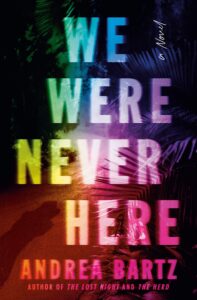
Andrea Bartz, We Were Never Here
(Ballantine)
Bartz’s latest, We Were Never Here, is a wildly entertaining, complex story of friendship, loyalty, and the corrosive reach of trauma. Emily and Kristen are best friends on a backpacking trip in Chile. Katie kills a man, claiming self-defense, but this isn’t the first time, and Emily grows suspicious, especially when the friends return Stateside and Katie seems to insinuating herself into Emily’s life in new, dangerous ways. Each chapter brings a new surprise and a new insight into what has to be one of the most insidious fictional friendships in recent memory. –DM
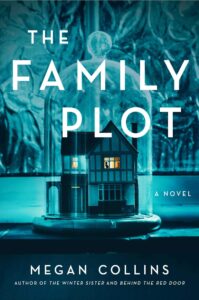
Megan Collins, The Family Plot
(Atria)
The title of this one works on so many levels! Megan Collins’ new true crime gothic has everything—a family obsessed with honoring the murdered, a mother who acts out death scenes, a father who silently hunts each day in the woods, a missing son, his lost twin sister, their mordant siblings, and a fateful family reunion that begins with the discovery of a mystery skeleton in a plot meant to be their father’s grave. –MO
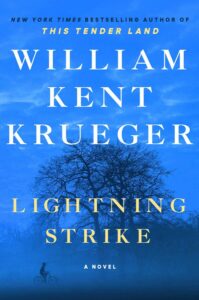
William Kent Krueger, Lightning Strike
(Atria)
William Kent Krueger, who wowed us with his last offering, the epic This Tender Land, is back this summer with a new novel in the Cork O’Connor series, only this time around we’re thrown into a deeply felt origin story. The setting is a familiar Minnesota, but we’re in the summer of 1963, and Cork is a small boy exploring the northern woods, when he happens upon a body. He’s shaken by the discovery—the dead man is someone he knows well—but also inspired to action, as he conducts his own investigation right beside the one his father, the sheriff, is conducting. The era’s small-town life is conjured up in sharp detail, but there’s also the distinct feeling that change is coming, a sweeping change bigger than any one family, and destined to alter the course of the community. –DM
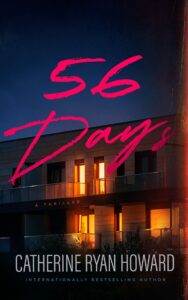
Catherine Ryan Howard, 56 Days
(Blackstone)
This is one of the buzziest books of the month, and rightfully so—Catherine Ryan Howard has written, if not the first thriller about the pandemic, then certainly the first good one. In Howard’s latest, two lonely people meet in a checkout line in Dublin just before lockdown, then decide to hole up together for what they assume could only be for a short while. 56 days later, one of them is dead. Howard structures her novel as a clever sort of countdown, dishing out slow reveals about each of the characters, until the shattering ending that I might label Tarantino-esque if it weren’t so intimate. –MO

Chandler Baker, The Husbands
(Flatiron)
In Chandler Baker’s delightful and furious take on Stepford Wives, the situation is reversed—a family moves to a selective new housing development in the suburbs of Austin where husbands do an enormous amount of helping around the house. It might even be suspicious, if it weren’t so nice to see for a change. While Baker’s narrator loves her red-blooded American husband, she wouldn’t mind it if he picked up the laundry every once in a while. Yet the suspicious death of one of her new neighbors in a house fire, coupled with the local male population’s willingness to discuss Tide pens, pushes her towards some investigating of her own. And here’s hoping the book heralds a new era of husbands in the title (as opposed to the now-ubiquitous wives). –MO

Peter Heller, The Guide
(Knopf)
Heller is building a reputation as a modern master of the wilderness thriller. In his latest, The Guide, a young man escapes pandemic anxieties and family trauma by taking a job at an isolated, elite fishing camp that targets the uber wealthy. His assignment is to take a pop star out on the river, but nearby cries of alarm drag him into an insidious mystery surrounding the camp’s real undertakings. Heller manages to perfectly balance meditations on nature, memory, and loss while also unspooling a gripping thriller. –DM
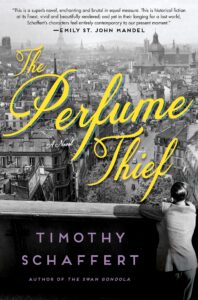
Timothy Schaffert, The Perfume Thief
(Doubleday)
This is the queer spy novel about WWII Paris that I never knew I needed and now could not possibly consider living without. Clementine, or Clem, a septuagenarian perfume artist dressed impeccably in men’s clothes, is sent on a mission by her songbird client to retrieve a book of perfume recipes key to reuniting the chanteuse with her parfumier father, in hiding from the Nazis. Elegant and elegiac, a paean to the Old Paris, or perhaps a Paris That Never Was, The Perfume Thief is perfectly pitched by the publisher as “A Gentleman in Moscow meets Moulin Rouge.” –MO

Louise Penny, The Madness of Crowds
(Minotaur)
While the entire Gamache series is undoubtedly some of the finest mystery tales ever created, Louise Penny’s latest is a small masterpiece all on its own. In this timely and complex novel, the Inspector is asked to provide security for a speaker at a nearby university. When he learns of the speaker’s atrocious politics, he refuses the commission, setting in motion a lengthy debate over academic freedom and the meaning of hate speech that soon devolves into murder. Three Pines has never faced such existential challenges as it will encounter in The Madness of Crowds. –MO




















